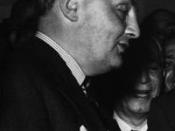1
The world has undergone massive changes, in ways both good and bad, since the
inception of the United Nations (UN) in 1945 (Strengthening the UN). The dawn of
new realities and challenges confronting the global community in the 21st century has
inevitably shaped new expectations and actions to be taken by the UN in national and
international affairs today. Many of the global challenges emerging within the last 68
years were not foreseen during the formation of the UN in 1945 (Thakur, 2004: 68).
These include environmental issues such as global warming, global terrorism, and the
rise in intra-state conflicts that poses threat to international peace and security. While
the international community has evolved fundamentally since 1945, minimal
structural changes have taken place within the UN, often reflecting an international
organization operating on a bygone era (Thakur, 2004: 68). Moreover, studies
conducted by the Senate Expenditure Committee in 1947 - just two years after the
creation of the UN - has shown that the UN was operating ineffectively with
problems of overlapping, duplication of effort, overly generous compensations of
staff, prompting for a reform on the UN finance and administration (Luck, 1997:
445). Calls for UN reform have therefore been endlessly discussed over the past
decades but there has been little consensus among members to what kind of reform is
needed and for what purpose (UN Reform). In this essay, I will be discussing some of
the reforms within the UN that has been raised and seek to propose why the reform of
the UN Security Council, in my view, is the pressing argument of reform within the
UN.
While some criticize the UN as an ineffective body today and identify the UN as 'a
talking shop where nothing ever gets done' on one hand, there are others...


